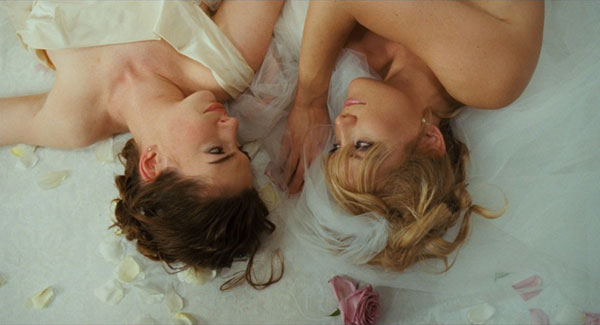 BRIDE WARS (2009)
BRIDE WARS (2009)
ZERO STARS/**** Image N/A Sound C Extras F
starring Kate Hudson, Anne Hathaway, Kristen Johnston, Candice Bergen
screenplay by Greg DePaul and Casey Wilson & June Diane Raphael
directed by Gary Winick
CATCH AND RELEASE (2007)
ZERO STARS/**** Image B Sound B Extras C
starring Jennifer Garner, Timothy Olyphant, Kevin Smith, Juliette Lewis
written and directed by Susannah Grant
WHAT HAPPENS IN VEGAS (2008)
[JACKPOT EDITION]
***/**** Image N/A Sound B Extras B+
starring Cameron Diaz, Ashton Kutcher, Rob Corddry, Dennis Miller
screenplay by Dana Fox
directed by Tom Vaughan
27 DRESSES (2008)
[WIDESCREEN EDITION]
**/**** Image N/A Sound B Extras B+
starring Katherine Heigl, James Marsden, Malin Akerman, Edward Burns
screenplay by Aline Brosh McKenna
directed by Anne Fletcher
ENCHANTED (2007)
**/**** Image A Sound A Extras D
starring Amy Adams, Patrick Dempsey, James Marsden, Susan Sarandon
screenplay by Bill Kelly
directed by Kevin Lima

by Walter Chaw I’m not kidding: Bride Wars is reptilian, hateful stuff, biologically engineered to disrespect–with maximum efficiency–the precise demographic to which it targets itself. It’s like an antibody to the middle-class, medium-attractive girl by virtue of encouraging her to associate herself with upper-middle-class, gorgeous avatars and, through that agency, act in ways completely hostile towards common sense and decency. It’s an epidemic of bad taste: there’s no other way to read the suggestion that size-zero Kate Hudson is a fat, disgusting swine for gaining five pounds pounding chocolate and cookies for a couple of weeks, is there? What’s harder to explain is a scene in the middle where rivals/best friends Liv (Hudson) and Emma (Anne Hathaway) do a slutty dance-off in a strip-club for the crown of “sexiest bride.” Here’s the weird part: one of them actually cares when the other one wins. In the middle of a movie that can only hope to attract women as its audience, here’s a scenario that physically exploits women as opposed to just emotionally or situationally (as is more to be expected). It’s like a soul kiss and a reach-around between Vin Diesel and Paul Walker to cap off a nice street race. But does it have the same chilling effect on its would-be audience, or does it instead feed into the electric lesbian tension that serves as the motor for all these “Sex and the City” knock-offs? Never mind, it’s not important. What is somewhat important is that Gary Winick, the heir-apparent to Garry Marshall’s chick-flick throne, be discouraged from ever directing another movie.


 by Ian Pugh
by Ian Pugh
 GRAN TORINO
GRAN TORINO![Jonas Brothers: The 3D Concert Experience (2009) [Deluxe Extended Movie] – Blu-ray Disc](https://i0.wp.com/filmfreakcentral.net/wp-content/uploads/2009/07/jonasbrothers.jpg?fit=1024%2C555&ssl=1)
 BRIDE WARS (2009)
BRIDE WARS (2009) by Ian Pugh
by Ian Pugh by Walter Chaw
by Walter Chaw by Walter Chaw
by Walter Chaw
 by Walter Chaw
by Walter Chaw![Taken (2008) [2-Disc Extended Cut] – Blu-ray Disc](https://i0.wp.com/filmfreakcentral.net/wp-content/uploads/2009/06/taken.jpg?fit=1024%2C435&ssl=1)
 by Ian Pugh
by Ian Pugh by Walter Chaw
by Walter Chaw![Friday the 13th (2009) [Killer Cut – Digital Copy Special Edition] – Blu-ray Disc](https://i0.wp.com/filmfreakcentral.net/wp-content/uploads/2009/06/fridaythe13th2009.webp?fit=1024%2C427&ssl=1)
 by Walter Chaw
by Walter Chaw